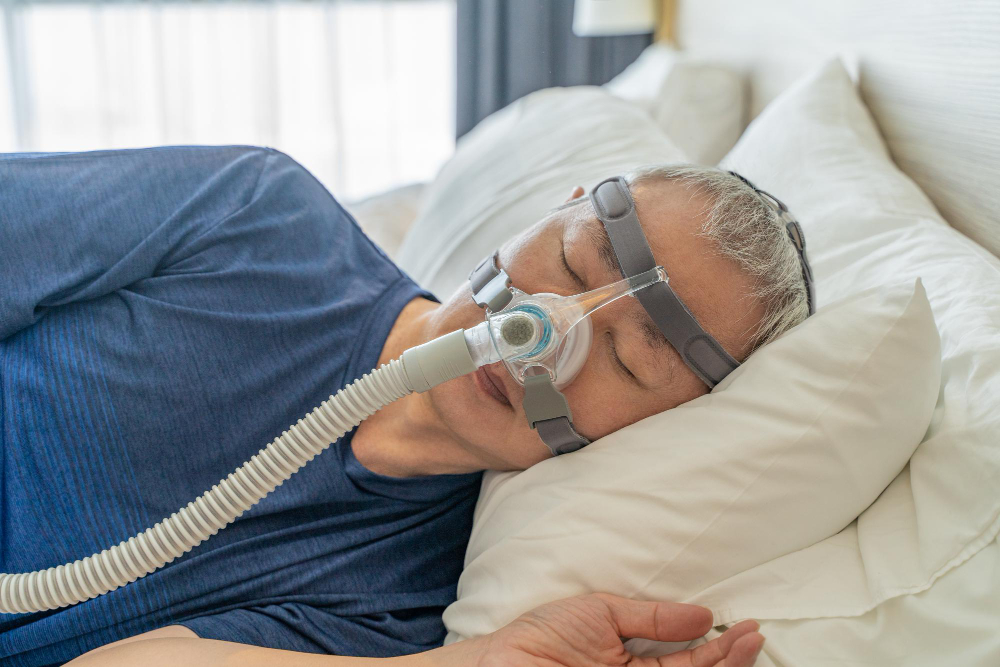
Sleep apnea, a common sleep disorder, especially in seniors is defined by interruptions in breathing patterns during sleep, potentially resulting in numerous health complications if not treated. These interruptions, which include shallow breathing or pauses in breathing, may persist for seconds to minutes and can occur repeatedly throughout the night.
Symptoms commonly associated with sleep apnea include
loud snoring,
observed pauses in breathing by others,
gasping or choking sounds during sleep,
excessive daytime sleepiness,
difficulty concentrating,
morning headaches, irritability, and
Restless sleep or insomnia.
There are two primary types: Obstructive Sleep Apnea (OSA) and Central Sleep Apnea (CSA).
Obstructive Sleep Apnea
Obstructive Sleep Apnea (OSA) is a prevalent form of sleep apnea characterized by repeated episodes of partial or complete obstruction of the upper airway during sleep. This obstruction typically occurs when the muscles in the throat relax excessively, causing the soft tissues in the airway to collapse and block airflow. As a result, individuals with OSA may experience disrupted breathing patterns, including pauses in breathing, snoring, gasping, or choking sounds during sleep.OSA is often associated with several risk factors, including obesity, anatomical abnormalities in the upper airway, large tonsils, a small jawbone, or a large neck circumference.
Central Sleep Apnea
Central Sleep Apnea (CSA) is a less common form of sleep apnea characterized by interruptions in breathing during sleep, resulting from a failure of the brain to send the appropriate signals to the muscles that control breathing. Unlike Obstructive Sleep Apnea (OSA), where airway obstruction is the primary cause of breathing pauses, in CSA, the airway is typically open, but the brain fails to initiate or regulate the breathing process.
The disruption in breathing patterns seen in CSA can lead to periods of shallow breathing or complete cessation of breathing during sleep. Individuals with CSA may experience symptoms such as daytime fatigue, difficulty concentrating, morning headaches, and irritability, similar to those seen in OSA.
Untreated sleep apnea is associated with a range of health risks, including cardiovascular diseases such as hypertension, heart attacks, and strokes, as well as diabetes, daytime fatigue contributing to accidents, and diminished quality of life.
Benefits of CPAP Machines for seniors
Continuous Positive Airway Pressure (CPAP) therapy has emerged as a primary treatment method for sleep apnea since the 1980s.
CPAP machines work by delivering a steady stream of air into the individual's airways, preventing them from collapsing or becoming obstructed during sleep. This continuous airflow helps alleviate snoring, improve insomnia, enhance concentration, and reduce the frequency of nighttime awakenings.
Adjusting CPAP machine settings to suit individual needs is essential for ensuring optimal therapy effectiveness. The machine's compressor generates pressurized air, which is directed through a flexible tube into masks securely sealed around the nose or mouth. This airflow acts against obstructions, ensuring adequate oxygen reaches the lungs and facilitating uninterrupted sleep.
Moreover, CPAP machines aid in reducing nasal swelling and preventing mucus buildup in the airways, leading to a sense of rejuvenation and improved restfulness after initial use. Consistency in CPAP therapy usage is paramount for long-term benefits.
Elder Care Service providers in Kolkata offer CPAP machine rentals, along with comprehensive assistance in setup, usage, and maintenance. Encouraging seniors to adhere to nightly CPAP therapy is crucial for effectively managing sleep apnea and promoting overall health and well-being.